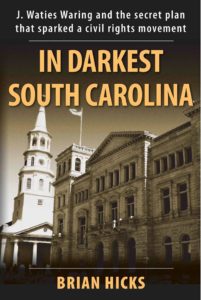As part of the Modjeska Simkins School’s Sunday Social series, on April 28, 4-6pm at 2015 Marion St. Post & Courier columnist Brian Hicks will talk about his latest book, In Darkest South Carolina: J. Waties Waring and the secret plan that sparked a civil rights movement. His remarks will be followed by a group discussion led by Robert Greene, a Claflin history professor and guest lecturer at the Modjeska School.
The talk is free and open to all. Questions? Call 803-808-3384.
Four years before the landmark US Supreme Court decision Brown v. Board of Education, a federal judge in Charleston hatched his secret plan to end segregation in America.
Julius Waties Waring was perhaps the most unlikely civil rights hero in history. An eighth-generation Charlestonian, the son of a Confederate veteran and scion of a family of slave owners, Waring was appointed to the federal bench in the early days of World War II. He had coveted a judgeship his entire life, but circumstance and fate denied him until he was 61. When Waring finally donned the robe, it changed everything he’d ever known.
Faced with a growing demand for equal rights from black South Carolinians, and a determined and savvy NAACP attorney named Thurgood Marshall, Waring did what he thought was right: He followed the law, and the United States Constitution. Shaken by the bigotry and backlash that followed each of his rulings, Waring soon had a moral awakening – and decided to set the world right.
In the midst of rebelling against home and heritage, Waring crossed two lines from which there was no return: He abandoned his wife of 30 years and married an intellectual Yankee divorcee, which led to his ostracism from Charleston’s South of Broad society. Then Waring ordered the South Carolina Democratic Party to allow African Americans to vote in its primary – and the entire state damned his soul.
The Ku Klux Klan bombarded Waring with threatening calls, letters and burning crosses. The Charleston newspapers declared war. Demagogue politicians promised to run the judge from the bench – and out of South Carolina. Waring’s ruling against discrimination in voting booths even inspired Gov. Strom Thurmond’s infamous Dixiecrat presidential bid. But the judge wasn’t finished. By 1950, Waring believed he’d found a way to destroy all Jim Crow laws, so long as he could carry out his scheme before he was impeached … or killed.
This is the story of 20th century America, where Harry Truman and Strom Thurmond carried on battles begun by Teddy Roosevelt and Ben Tillman, where a Clarendon County preacher risked his life for equality, and a gentle Charleston teacher showed thousands how to claim their civil rights. This is the story of Judge J. Waties Waring, his incredible life and the country he changed. And it all began in darkest South Carolina.
• • •
From In Darkest South Carolina: An early winter storm devastated Charleston the last weekend of November. Tat Saturday, three people died of exposure as temperatures dropped into the teens — colder than it had been along the South Carolina coast in seven years. Pipes burst across the city, leaving many residents without water. One woman was found frozen on the waterfront near the Battery and the Fort Sumter Hotel, where the Southern governors were holding their annual convention.
The next day, 125 people set out from Morris Street Baptist church for a nearly two-mile march to 61 Meeting Street. The walk was not unbearable; the temperature ultimately rose to 48, 10 degrees above the forecast. These people — 100 of them black, 25 white — were led by Modejska Simkins, the Columbia activist and state chairman for the Southern Conference Education Fund. The “pilgrimage” had been her idea to honor Judge Waring and his wife for their dedication to civil rights.
The group walked uncluttered sidewalks along King and Meeting streets for nearly an hour before arriving at the judge’s home. There they found an atypical South of Broad scene: a government car parked beneath a palm tree. An armed marshal casually leaning against the house. It looked like a fortified compound in enemy territory. But the Warings stood outside, near their front door, shaking hands with every one of the pilgrims.
It was a simple ceremony. With the group fanning out on the sidewalk and spilling into Meeting Street, Simkins read a citation that praised Waring for his “wise, just and courageous” work, his understanding of democracy, as well as his dedication to protecting the rights of suffrage and the freedom and equality of men.
“Yet it has been seen that many another, in your place, has found it possible, before obdurate prejudices and customs, to avoid the guidance of the noblest guarantees of our constitution,” Simkins said. “Your own faithfulness in this field, despite environmental discouragements others have bowed to, has been exemplary and heartwarming.”
The judge was moved by this tribute more than any other he’d ever received.
• • •
 Hicks’ journalism has appeared in national and international publications since 1986, and he has written about Southern history and politics for 30 years. He has been featured on CBS Sunday Morning, National Public Radio, the Discovery Channel, the National Geographic Channel and in Smithsonian Magazine. His column has won three Green Eyeshade Awards for best commentary in the Southeast from the Society of Professional Journalists, and Hicks is a former South Carolina Press Association Journalist of the Year.
Hicks’ journalism has appeared in national and international publications since 1986, and he has written about Southern history and politics for 30 years. He has been featured on CBS Sunday Morning, National Public Radio, the Discovery Channel, the National Geographic Channel and in Smithsonian Magazine. His column has won three Green Eyeshade Awards for best commentary in the Southeast from the Society of Professional Journalists, and Hicks is a former South Carolina Press Association Journalist of the Year.
His previous books include Ghost Ship, When the Dancing Stopped and The Mayor. His Toward the Setting Sun and Raising the Hunley were selections of the Book-of-the-Mouth Club, as well as the History and Military Book Clubs.
A native of Tennessee, Hicks has lived in Charleston for more than 20 years.?
